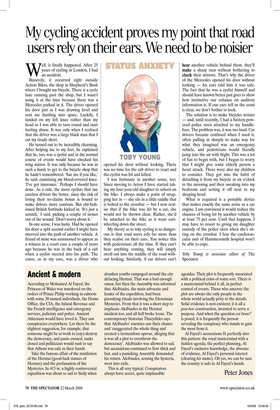My cycling accident proves my point that road users rely on their ears. We need to be noisier
Well, it finally happened. After 25 years of cycling in London, I had an accident. Bizarrely, it occurred right outside Action Bikes, the shop in Shepherd’s Bush where I bought my bicycle. There is a cycle lane running past the shop, but I wasn’t using it at the time because there was a Mercedes parked in it. The driver opened his door just as I was drawing level and sent me hurtling into space. Luckily, I landed on my left knee rather than my head so I was able to turn round and start hurling abuse. It was only when I realised that the driver was a large black man that I cut my tirade short.
He turned out to be incredibly charming. After helping me to my feet, he explained that he, too, was a cyclist and in the normal course of events would have checked his wing mirror. It was only because he was in such a hurry to get to the bicycle shop that he hadn’t remembered. ‘Sue me if you like,’ he said, examining my blood-covered knee. ‘I’ve got insurance.’ Perhaps I should have done. As a rule, the more cyclists that sue careless drivers the better, since the risk of losing their no-claims bonus is bound to make drivers more cautious. But old-fashioned British fortitude kicked in. ‘It’s just a scratch,’ I said, picking a couple of stones out of the wound. ‘Don’t worry about it.’ In one sense, I was lucky. Had he opened his door a split second earlier I might have swerved into the path of another vehicle. A friend of mine was summoned to appear as a witness in a court case a couple of years ago because he was in the back of a cab when a cyclist steered into his path. The cause, as in my case, was a driver who opened his door without looking. There was no time for the cab driver to react and the cyclist was hit and killed.
I was fortunate in another sense, too. Since moving to Acton I have started taking my four-year-old daughter to school on the bike. I always make a point of strapping her in — she sits in a little saddle that is bolted to the crossbar — but I now realise that if the bike was hit by a car, she would not be thrown clear. Rather, she’d be attached to the bike as it went cartwheeling down the street.
My theory as to why cycling is so dangerous is that road users rely far more than they realise on their ears. You notice this with pedestrians all the time. If they can’t hear anything coming, they will simply stroll out into the middle of the road without looking. Similarly, if car drivers can’t another vehicle behind them, they’ll a sharp turn without bothering to k their mirrors. That’s why the driver of the Mercedes opened his door without looking — his ears told him it was safe. The fact that he was a cyclist himself and should have known better just goes to show how instinctive our reliance on auditory information is. If our ears tell us the coast is clear, we don’t bother to look.
The solution is to make bicycles noisier — and, until recently, I had a battery-powered police siren attached to my handlebars. The problem was, it was too loud. Car drivers became confused when I used it, often pulling in sharply to make way for what they imagined was an emergency vehicle, and pedestrians would literally jump into the air with fright. This was a lot of fun to begin with, but I began to worry that I might give some elderly person a heart attack. There were also my children to consider. They got into the habit of detaching it from my bicycle at six o’clock in the morning and then sneaking into my bedroom and setting it off next to my sleeping head.
What is required is a portable device that makes exactly the same noise as a car engine. I am convinced it would reduce the chances of being hit by another vehicle by at least 75 per cent. Until that happens, I may have to resort to giving my daughter custody of the police siren when she’s sitting on the crossbar. I fear the cardiovascular unit of Hammersmith hospital won’t be able to cope.


















































































 Previous page
Previous page